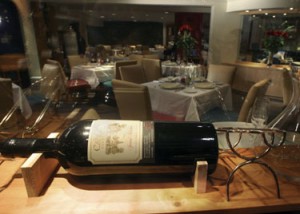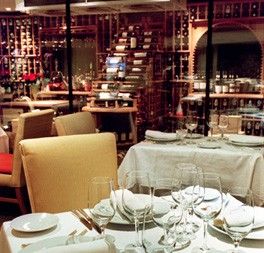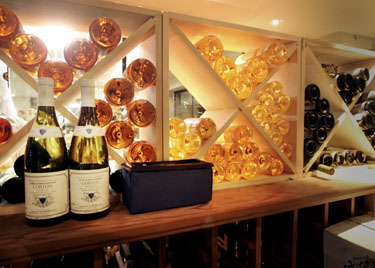The wine director of Michel Richard’s Citronelle joins the ranks of only other fifteen women in the world to have earned this coveted title.
By Kelly A. Magyarics
After an excruciatingly difficult four-day long exam, Kathy Morgan probably craved a glass or two of wine. The Wine Director and Sommelier of Citronelle recently became only one of 106 individuals worldwide (and one of only 16 women) to achieve the title of Master Sommelier, following years of preparation and study. And it’s not like anyone can sign up to become a candidate for this highly sought-after wine certification. The Court of Master Sommeliers grants the opportunity by invitation only. To put it all in perspective, at the end of the exam held recently at the Four Seasons Resort and Club Dallas at Las Colinas, Morgan was the only wine student left standing.
Now that’s an achievement worth toasting.
Before Morgan’s position at Citronelle (3000 M Street NW, 202.625,2150), she developed wine list for many DC restaurants including Occidental Grill, Tosca and 2941. We asked this prolific oenophile to share her thoughts on the Master Sommelier process, hot wine trends and regions, and tips for navigating a restaurant wine list:
What was the hardest part of obtaining the Master Sommelier Diploma?
It’s tough to say what the hardest part is. This is an exam that averages a 10% pass rate (significantly less in 2010,) so it’s not as if any of it is easy. For me personally, gaining the confidence not to second-guess myself was extremely important. I would not have passed without it.
What wine trends are you tired of?
I try to turn trends into an opportunity to introduce guests to something new. For instance, when people ask for Pinot Grigio, I suggest other crisp, un-oaked European whites like Albarino, Fiano or Godello. The guest is always happy with the choice, and I get to sell wines that are not this year’s big thing. [Citronelle has the 2007 Veiga Serantes Albarino on the menu for $50, and the 2007 Terradorra Fiano d’Avellino for $16 a glass and $65 a bottle.]
What grapes/regions most excite you right now?
I’m always excited to further my education by tasting something I’ve only read about, but nothing is more exciting to me than drinking wines I have always loved: mature red Burgundy and Riesling—especially old German Riesling, but Austrian, Australian and Alsatian versions work, too! [Try a glass of the dry 2002 Domaine Charles Schleret Alsace Riesling “Herrenweg” for $14 a glass; or, for an off-dry style, opt for a glass of the 2007 Weingut Spreitzer Oestricher Lenchen Riesling Kabinett from Germany. Both are also available by the bottle for $55.]
Name some tips for wine lovers looking for quirky, off-the-beaten-path yet budget-friendly wines.
Spain is a great place to find interesting varietals and great value. Look for Garnacha, Monastrell and Godello. [Citronelle has about fifteen Spanish reds by the bottle, along with a handful of Spanish whites.]
How should a nervous diner who has been given the job of selecting a wine for the table tackle a list?
Relax! It is not necessary to be extremely knowledgeable. Just learn to describe what you like, and a sommelier can easily and painlessly help you “wow” your guests. It is also easy to tell us what you want to spend without saying a word. Ask about a specific, appropriately priced wine while dragging your finger across the page to its price. Also, don’t smell the cork, don’t take a sip of water right before assessing the wine, and handle the glass by the stem—not the bulb. You will look like a complete pro!

Citronelle features some impressive bottles, but Morgan is happy to suggest wine at any price point.
What’s your favorite wine region to visit? Where haven’t you gone yet but would like to?
Italian wineries always offer such wonderful hospitality, and I love how the wines of each region are so perfectly in tune with their respective cuisines. I have never been to Germany, and as a Riesling freak, I really think I should go!
What other wine goals do you have left?
Now that there are no exams left to study for, I am concentrating on giving back. Mentoring future masters in the DC area, and teaching the lower level courses with the Court of Master Sommeliers. I am also thinking about writing a book.
What do you drink when you aren’t drinking wine?


